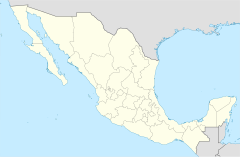| 2010 San Fernando massacre | |
|---|---|
| Part of the Mexican drug war | |
| Location | San Fernando, Tamaulipas, Mexico |
| Coordinates | 24°55′46″N 97°56′44″W / 24.92944°N 97.94556°W |
| Date | 24 August 2010 |
| Target | Civilians and Gulf Cartel hitmen |
Attack type | Mass murder, kidnapping |
| Deaths | 72 |
| Injured | 3[1] |
| Perpetrator | Los Zetas |
The 2010 San Fernando massacre, also known as the first massacre of San Fernando,[2] was the mass murder of 72 undocumented immigrants by the Los Zetas drug cartel in the village of El Huizachal in the municipality of San Fernando, Tamaulipas, Mexico. The 72 killed—58 men and 14 women—were mainly from Central and South America, and they were shot in the back of the head and then piled up together. The bodies were found inside a ranch on 24 August 2010 by the Mexican military after they engaged in an armed confrontation with members of a drug cartel.[3][4] They received information of the place after one of the three survivors survived a shot to the neck and face, faked his death, and then fled to a military checkpoint to seek help.[5][1] Investigators later mentioned that the massacre was a result of the immigrants' refusal to work for Los Zetas,[5] or to provide money for their release.
On 17 June 2011 the Federal Police captured Édgar Huerta Montiel, alias El Wache, the major perpetrator of the mass murder. His contention was that the immigrants were killed because Los Zetas believed that they were going to be recruited by the Gulf Cartel, a rival gang.[6] He also confessed that other bodies were put in mass graves.[6] The immigrants were abducted from several buses, the same way others were abducted for the 2011 San Fernando massacre.[7] The police chief that was in charge of leading the investigation of the massacre was killed by suspected members of a drug cartel.[8]
The massacre was reported as "the biggest single discovery of its kind" in the Mexican Drug War,[9] and as "the worst known atrocity committed by Mexico's drug trafficking organization to date".[10] The National Alliance of Latin American and Caribbean Communities asked for those responsible "to be brought to justice for such atrocity", and Amnesty International said that this "human rights crisis" is a result of "one of the most dangerous trajectories" undocumented immigrants have to cross before reaching the United States.[11] The Mexican drug trafficking organizations often use vacant lots, ranches, and mine shafts to keep their victims and execute their rivals.[12] Nonetheless, in 2010, this was the largest body dumping ground found since the start of Mexico's drug war.[12]
The massacre was condemned by a number of countries and international organizations. Felipe Calderón, the president of Mexico at the time, condemned the massacre and sent his condolences to the families of those affected.[13]
- ^ a b "Presidente de El Salvador dice que hay un tercer sobreviviente de masacre". Expansion (in Spanish). 5 September 2010. Archived from the original on 7 February 2018. Retrieved 8 March 2012.
- ^ "San Fernando, otra vez. ¿Cuántas más?". La Jornada (in Spanish). 24 April 2011. Archived from the original on 9 February 2012. Retrieved 6 March 2012.
- ^ "Marina encuentra 72 cuerpos en fosa en Tamaulipas". El Universal (in Spanish). 25 August 2010. Archived from the original on 10 January 2012. Retrieved 6 March 2012.
- ^ "Los Zetas" reclutaban migrantes en San Fernando". Milenio (in Spanish). 23 August 2010. Archived from the original on 28 January 2013. Retrieved 7 March 2012.
- ^ a b "Migrants killed for refusing to be assassins, teen says". MSN News. 26 August 2010. Retrieved 6 March 2012.
- ^ a b "Policías federales detienen al coordinador de la masacre en San Fernando". Expansion (in Spanish). 17 June 2011. Archived from the original on 7 February 2018. Retrieved 6 March 2012.
- ^ "Caso San Fernando: la hipótesis de los autobuses secuestrados se fortalece". Expansion (in Spanish). 8 April 2010. Archived from the original on 29 July 2016. Retrieved 6 March 2012.
- ^ "Report: Mexican cop investigating murders of 72 migrants is dead". USA Today. 27 August 2010. Archived from the original on 29 April 2011. Retrieved 6 March 2012.
- ^ Robin Emmott; Patrick Rucker; Miguel Angel Gutierrez (25 August 2010). "Drug hitmen dump 72 bodies at Mexican ranch". Reuters. Archived from the original on 26 August 2010. Retrieved 26 August 2010.
- ^ "People-smuggling: No safe passage". The Economist. 9 September 2010. Archived from the original on 21 September 2011. Retrieved 6 March 2012.
- ^ "Varias organizaciones en EE.UU. condenan matanza de 72 inmigrantes en México" (in Spanish). Terra Networks. 26 August 2010. Archived from the original on 1 March 2014. Retrieved 6 March 2012.
- ^ a b "Marines find 72 bodies in Tamaulipas state". The Monitor. 25 August 2010. Archived from the original on 2010-08-27. Retrieved 10 July 2012.
- ^ "Felipe Calderón acusa al grupo 'Los Zetas' del crimen de los 72 migrantes". Expansion (in Spanish). 26 August 2010. Archived from the original on 7 February 2018. Retrieved 6 March 2012.

